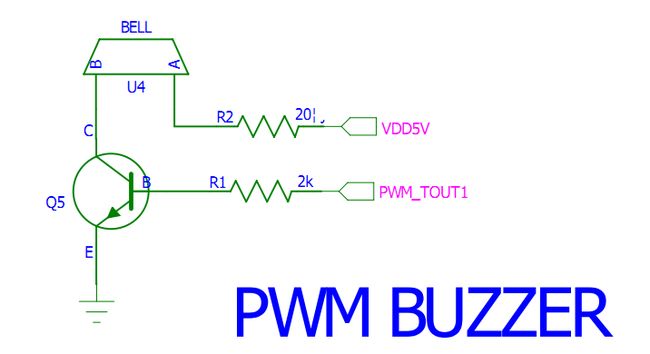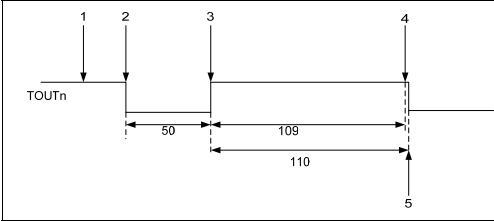OK6410之蜂鸣器驱动硬件分析---PWM定时器
在OK6410开发板中,蜂鸣器的IO口为GPF15
关于GPF15的GPIO详细参考S3C6410的PDF手册
GPF14 [29:28] 00 = Input 01 = Output 10 = PWM TOUT[0] 11 = CLKOUT[0]
GPF15 [31:30] 00 = Input 01 = Output 10 = PWM TOUT[1] 11 = Reserved
重点介绍PWM定时器工作:
S3C6410X中有5个定时器,这些定时器产生内部中断。其中,Timer0和Timer1具有PWM功能,而Timer2,3,4没有此功能。
PWM具有两种操作模式:自动装载模式,一次触发模式。为实现PWM功能,芯片提供了16个功能寄存器。这些功能寄存器都连接APB总线。
定时器具有双缓冲特性,这样就能在不停止当前定时器操作的情况下,为下次定时器运行装入新的数值。尽管为定时器设置了新数值,但当前的定时操作能够成功完成。定时器从TCNTBn读取的值是为下次延时定时用的,并不影响当前定时器的运行。当TCNTn减小到0的时候,TCNTBn的值会自动复制到TCNTn中,这就是说的自动装载操作。定时器的当前计数值可以从定时计数观察寄存器中TCNTOn读取。如果TCNTn为0且从装载也为0的话则TCNTn不在进行下次操作。
在S3C6410的PDF手册中介绍PWM的工作流程:
The Pulse Width Modulation function (PWM) uses the value of the TCMPBn register. The timer control logic
changes the output level when the down-counter value matches the value of the compare register in the timer
control logic. Therefore, the compare register determines the turn-on time (or turn-off time) of a PWM output.
The TCNTBn and TCMPBn registers are double buffered to allow the timer parameters to be updated in the
middle of a cycle. The new values will not take effect until the current timer cycle completes.
A simple example of a PWM cycle is shown in the figure below.
1. Initialize the TCNTBn with 159(50+109) and the TCMPBn with 109.
2. Start Timer by setting the start bit and manual update bit off.
The TCNTBn value of 159 is loaded into the down-counter, the output is driven low.
3. When down-counter counts down to the value in the TCMPBn register 109,
the output is changed from low to high
4. When the down-counter reaches 0, the interrupt request is generated.
5. The down-counter is automatically reloaded with TCNTBn, which restarts the cycle.
对于PWM 功能,要用到寄存器TCMPBn,当递减计数器down-counter的值和比较寄存器TCMPBn的值相同时,定时控制逻辑模块就会改变输出电平。因此比较寄存器TCMPBn决定了PWM的输出。
定时器0工作寄存器:
在TCFG1 (Timer Configuration Register) 中
在 TCON (Timer Control Register)中
见下一篇:OK6410之蜂鸣器驱动软件分析---PWM定时器
http://blog.csdn.net/sun_rise2011/article/details/7978395





